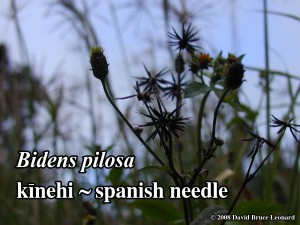Skip to content
Bidens pilosa
 PLANT NAME: Bidens spp
PLANT NAME: Bidens spp
OTHER NAMES: Adenolepis spp., Campylotheca spp.
SIMILARLY USED SPECIES: Bidens pilosa, B. bipinnata (gui zhen cao, nian shen cao) B. biternata, B. chinensis, B. parvif ora (xiao hua gui zhen cao), B. tripartite, B. chilensis.
COMMON NAMES: Kïnehi (Bidens pilosa) , ko’oko’olau (native Bidens species) [Hawai’i]; xian feng cao (“abundant weed”), gui zhen [China]; aceitilla [Spanish]; amor seco (Desmodium adscendens is also called ” amor seco”) [Peru]; beggars tick / spanish needle / needle grass [USA]; black jack [South Africa]; cobblers peg [Australia]; fi si ‘uli [Tonga]; has kung chia, han feng cao [Taiwan]; muni [Aymara, Quechua]; ottrancedi [India]; picao preto, cuamba [Brazil]; piripiri [Cook Islands]; saetilla, sillk’iwa [Quechua]; sanana vinillo, saytilla, natilluna [Bolivia]; spanish needle, needle grass [Barbados, St. Thomas]; te de coral [Mexico]; z’herbe zedruite [Caribbean]; fi si’uli [Tonga]; uqadolo [Southern Africa]; z’herbe zedruite, z’herbe z’aiguille [Dominica, Martinique].
 NOMENCLATURE: From a Western perspective, Bidens (meaning “two teeth”) is a reference to hairy calyx (pappus) of some species. The name “pilosa” means “hairy.” In China the many species and varieties of Bidens are often lumped under the names xian feng cao (“abundant weed”) or gui zhen cao (“demon spike grass” / “ghost needle weed”)cao but each species (see “similarly used species” above) will sometimes have a different Chinese common name. (“demon spike grass” or “ghost needle weed”) In Taiwan Bidens species are called “ham hong chho.”
NOMENCLATURE: From a Western perspective, Bidens (meaning “two teeth”) is a reference to hairy calyx (pappus) of some species. The name “pilosa” means “hairy.” In China the many species and varieties of Bidens are often lumped under the names xian feng cao (“abundant weed”) or gui zhen cao (“demon spike grass” / “ghost needle weed”)cao but each species (see “similarly used species” above) will sometimes have a different Chinese common name. (“demon spike grass” or “ghost needle weed”) In Taiwan Bidens species are called “ham hong chho.”
Many common names of Bidens are a reference to the fruits that are aggravating hitchhikers. Hence the names “demon spike grass” and “ghost needle weed.” Beggars tick is a reference to the fact that hobos would gather these on their clothing as they walked along railroad tracks. • Some Chinese will use Bidens interchangeably with Desmodium spp, as they are thought to be almost therapeutically identical. In China they even share the same name: “nian shen cao.” In South America Bidens is also used interchangeably with Desmodium spp. and there they also share a local common name: “amor seco.” • On a clinical note, current research has shown both plants to be liver protective.
FAMILY: Asteraceae
CATEGORY: Clear Heat and Toxins
PROPERTIES:Bitter, bland, sweet, neutral to cool [China].
PLANT PART USED: Whole plant.
WESTERN FUNCTIONS REPORTED: ” Blood purifier” (infused); antibacterial; “antibiotic”; antidote; antidysenteric; antihemorrhagic; anti-infl ammatory; antimalarial; antimicrobial; antipyretic; astringent; carminative; circulation promoting; diuretic; emmenagogue; emollient; hepatoprotective; hypotensive; intoxicant; lactogogue; liver protective; mucous membrane tonic; prevents flu & colds; sialogogue; stagnant blood dispelling; stimulates childbirth; styptic; urogenital system tonic; vulnerary.
TRADITIONAL CHINESE ENERGETIC FUNCTIONS:
1) Cools and resolves the surface.
2) Clears heat and toxins, removes toxins, removes stagnation.
3) Invigorates blood.
4) Clears damp heat from the lower jiao.
5) Removes wind dampness.
6) Purges fire.
7) Reduces swelling [Taiwan].
Common Medicinal Uses : Colds and flu – Acute or chronic hepatitis – General bacterial infections – Inflammatory conditions – Urinary tract infections
USE AS FOOD: Young leaves sometimes eaten raw or steamed, but the taste can be a bit strong. In Zimbabwe the leaves are boiled with peanut butter and eaten. Bidens pilosa is eaten in Africa as a vegetable. Fermented with rice to make “sake.”
RANGE: Bidens pilosa is native to South America, the Caribbean, Africa, and the Philippines. There are 60 native species of Bidens in Hawai’i, and 19 of those are endemic.
CAUTIONS AND CONTRAINDICATIONS: Can irritate the bladder and kidney in high doses. Some constituents may be weak esophageal carcinogens [Mirvish 1979].
Please note some combinations are toxic! Do not self administer without the supervision of a licensed practitioner or an experienced Elder.
NOTES
-
Bidens spp. are used widely as a folk medicine in China and have a long history of use (particularly in Taiwan) for common cold, dysentery, and hepatitis. Two types of Bidens are mentioned in the Chinese classic, the Ben Cao Gang Mu (1596 A.D.)
-
Kïnehi flowers are hermaphroditic, they have both male and female sex organs.
-
An ingredient in the Chinese patent Gan Mao Qing.
-
Please note that some of the above actions and indications are taken from old Hawaiian material may refer to native endemic species of Bidens, not to Bidens pilosa. Almost all other information (non- Hawaiian) contained here is a reference to Bidens pilosa. My experience is that the endemic species are more effective for digestion and the alien species is more effective with infections and inflammation. Do not use an endemic species of Bidens as medicine unless you are absolutely sure that it is not rare or endangered. • Both a poignant blessing and an abominable curse, most herbalists in Hawai’i have a love-and-loathing relationship with kïnehi. Like a dysfunctional romance, it can make us joyous or crazy depending on the circumstances.

 PLANT NAME: Bidens spp
PLANT NAME: Bidens spp  NOMENCLATURE: From a Western perspective, Bidens (meaning “two teeth”) is a reference to hairy calyx (pappus) of some species. The name “pilosa” means “hairy.” In China the many species and varieties of Bidens are often lumped under the names xian feng cao (“abundant weed”) or gui zhen cao (“demon spike grass” / “ghost needle weed”)cao but each species (see “similarly used species” above) will sometimes have a different Chinese common name. (“demon spike grass” or “ghost needle weed”) In Taiwan Bidens species are called “ham hong chho.”
NOMENCLATURE: From a Western perspective, Bidens (meaning “two teeth”) is a reference to hairy calyx (pappus) of some species. The name “pilosa” means “hairy.” In China the many species and varieties of Bidens are often lumped under the names xian feng cao (“abundant weed”) or gui zhen cao (“demon spike grass” / “ghost needle weed”)cao but each species (see “similarly used species” above) will sometimes have a different Chinese common name. (“demon spike grass” or “ghost needle weed”) In Taiwan Bidens species are called “ham hong chho.”
